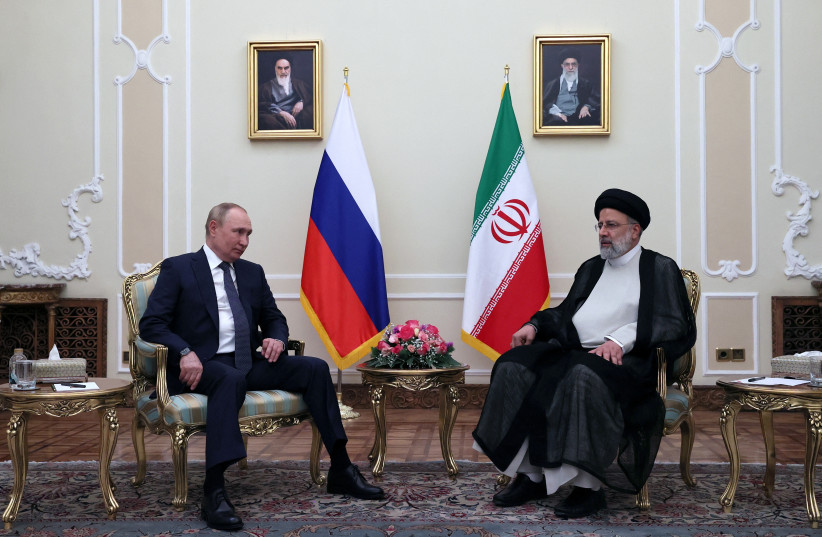Iran wants to acquire sophisticated Russian weaponry, a move that would only increase its ability to destabilize the region, US National Security Council spokesman John Kirby told reporters on Thursday, as he charged that the Islamic Republic was behind the attacks on maritime shipping routes.
“We have reason to believe that they want their hands on some sophisticated attack helicopters, fixed-wing aircraft, missiles, cruise and/or ballistic,” he said.
“There is clearly a growing relationship in the defense realm between these two countries,” he said.
Ebrahim Raisi meets with Vladimir Putin
Iran’s push for additional military capability is concerning for the Middle East, Kirby said, as Iranian President Ebrahim Raisi met in Moscow with President Vladimir Putin.
Iranian authorities have said military cooperation with Russia is expanding day by day. Iran said last month it had finalized arrangements for Russia to provide it with Su-35 fighter jets, Mi-28 attack helicopters, and Yak-130 pilot training aircraft.

In televised opening remarks in Moscow Thursday, neither leader referred to their countries’ growing military cooperation. Putin said it was very important to discuss the situation in the Middle East, especially in the Palestinian territories.
Raisi responded via a translator: “What is happening in Palestine and Gaza is of course genocide and a crime against humanity.” He said it was “even more sad” that this was supported by the United States and the West, from the war in Ukraine and enabling Moscow to align itself with developing countries in solidarity with the Palestinians.
In Washington, Kirby spoke about Iran’s role in targeting ships on maritime routes in the Red Sea, explaining that it was the Islamic Republic that was behind the Houthi attacks.
“We have every reason to believe that they [the Houthis] are being enabled by Iran,” he said, as he explained that the US was looking to expand its multinational maritime task force.
The Houthis say they have been staging drone and missile attacks against Israel and Israeli ships in the Red Sea in response to the offensive Israel launched against Hamas in Gaza after the October 7 rampage into Israel by Hamas.
Iran denies any involvement in the attacks.
Washington has said that US warships have downed missiles and drones fired by the Houthis although the Pentagon says it has not been clear that the American vessels were actually targeted. U.S. warships have also intercepted attacks on commercial ships that the US military says were linked to multiple nations.
The United States imposed sanctions on Thursday on 13 individuals and entities for allegedly funneling tens of millions of dollars in foreign currency to Yemen’s Houthi group from the sale and shipment of Iranian commodities.
The Treasury said in a statement that the Islamic Revolutionary Guard Corps, Iran’s paramilitary and espionage force, backed the scheme involving a complex web of exchange houses and firms in multiple countries, including Yemen, Turkey, and St. Kitts and Nevis.
Treasury Undersecretary Brian Nelson said funds provided by Iran have enabled recent attacks by the Houthis on commercial shipping in the Red Sea that endanger international trade.
“The Houthis continue to receive funding and support from Iran, and the result is unsurprising: unprovoked attacks on civilian infrastructure and commercial shipping, disrupting maritime security and threatening international commercial trade,” the Treasury statement quoted Nelson as saying.’
The sanctions freeze all properties and interests in the United States of those targeted and generally prohibit Americans from conducting transactions with them.
The Treasury said that the targeted network involved Said al-Jamal, a key “Iran-based Houthi financial facilitator,” and Bilal Hudroj, who runs a Lebanon-based exchange house, both of whom already are under US sanctions.
Jamal has for years used a web of exchange houses in Yemen and abroad to funnel the proceeds of Iranian commodity sales to the Houthis and the IRGC, the Treasury said, adding that Hudroj has assisted in the remittances to the Houthis.
The 13 entities and individuals hit in the latest sanctions include a jewelry shop and exchange house in Turkey, the Treasury said, as well as exchange houses, shipping agents, and individuals in St. Kitts and Nevis, Britain, and Russia.
